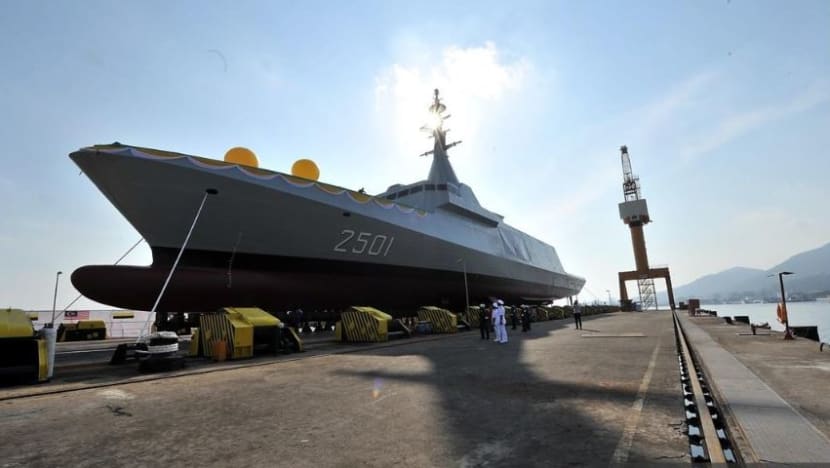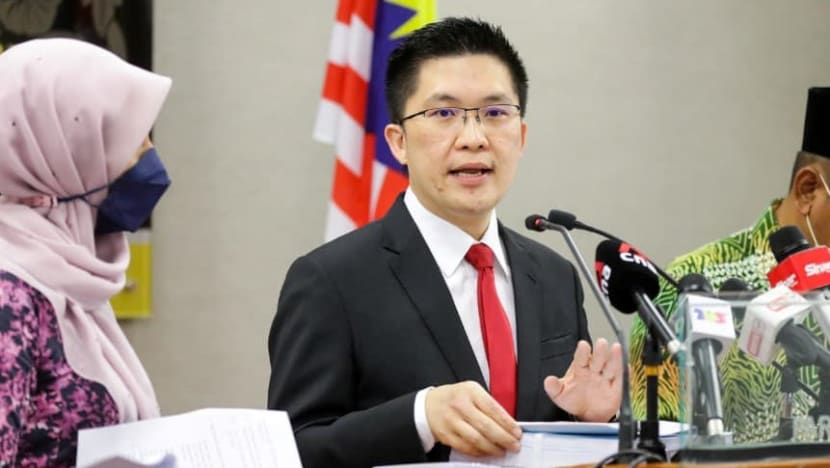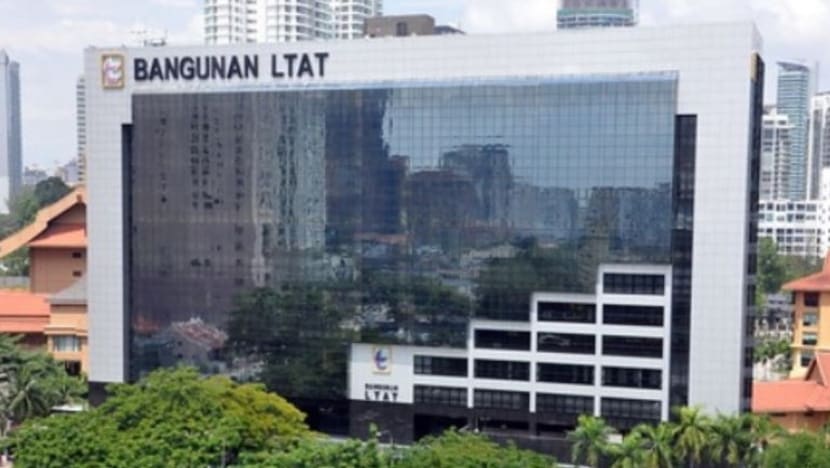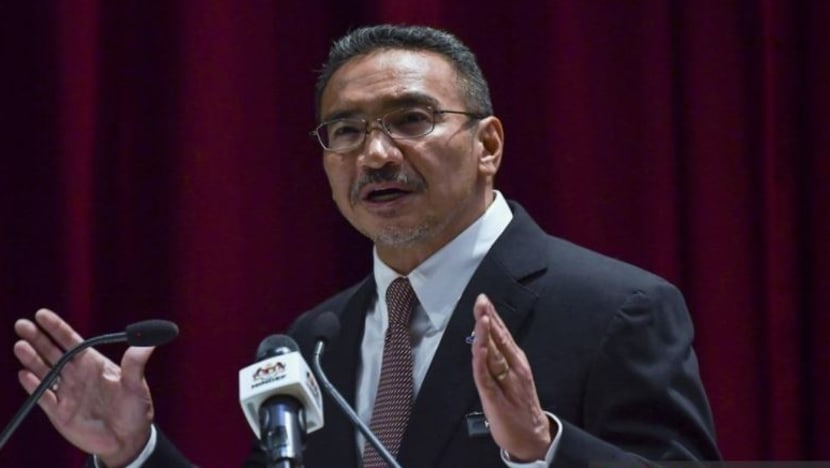CNA Explains: What went wrong with Malaysia's RM9 billion warship procurement?
The Malaysian government has paid RM6.08 billion so far to Boustead Naval Shipyard Sdn Bhd for the purchase of six combat ships. Five should have been handed over to the navy by August 2022, but none has been delivered.

The first littoral combatant ship (LCS) Maharaja Lela was launched at an event at the naval shipyard in Lumut, Perak, in 2017. (Photo: Bernama)
KUALA LUMPUR: The Malaysian parliament's Public Accounts Committee (PAC) tabled a report last week on the procurement of littoral combatant ships (LCS), two years after starting a probe into the RM9.13 billion (US$2.05 billion) contract.
The committee said the project to construct six ships was awarded by the Ministry of Defence to Boustead Naval Shipyard Sdn Bhd (BNS) through direct negotiation, and the government has paid RM6.08 billion or 66.65 per cent of the cost so far.
"However, not even one of the LCS ships has been delivered. According to our timeline, five LCS ships should have been completed and handed over to us by August 2022,” said PAC chairman and Ipoh Timor MP Wong Kah Woh during a press conference last Thursday (Aug 4).
The issue first drew public attention in August 2020 during the tabling of the 2019 auditor-general’s report in parliament.
Altogether, the PAC held nine rounds of proceedings from November 2020 to March 2022.
Among those called up to the proceedings were former Defence Minister Ahmad Zahid Hamidi, current Defence Minister Hishammuddin Hussein who also held the position from May 2013 to May 2018, former navy head Admiral Abdul Aziz Jaafar and officials from Boustead subsidiaries.
According to Boustead Heavy Industries Corporation Berhad, the LCS is a frigate-class vessel that can perform complex naval missions covering all four dimensions of modern warfare, namely anti-air warfare, anti-surface warfare, anti-submarine warfare and electronic warfare.
The acquisition of LCS was a project under the navy’s transformation plan to reduce the number of ship classes from 15 to five, the PAC said.
“Under the navy transformation, there were supposed to be 12 LCS. However, this contract only involved six LCS,” said the report.
Following the tabling of the PAC report, the Malaysian navy said that it fully supports the investigations of any leakages in the project and that those involved must be brought to justice as soon as possible.
It stressed that the LCS is a critical asset to maintain the country’s safety and sovereignty.
“The navy requires combat capabilities that are in line with the developments of the regional security geostrategic and geopolitical landscape,” it said in a statement on Aug 6.

WHAT ARE THE PAC FINDINGS?
The PAC found that not a single ship has been completed even though the first ship was due to be delivered in April 2019.
The second and third ships were due for delivery in February and March 2020, the fourth ship by October 2021 and the fifth ship in August this year.
Currently, the physical progress for these five ships stands at 44 per cent, 35 per cent, 32 per cent, 27 per cent and 16 per cent respectively.
No work has started on the sixth and final ship that was scheduled to be delivered in October next year.
The report also said that the views of the navy as the end user were ignored by the Ministry of Defence and the BNS.
This resulted in the original Sigma design chosen by the navy being changed to the Gowind design in July 2011 after a suggestion by BNS to Ahmad Zahid, who was then Defence Minister.
Sigma was a design by a Dutch company while the Gowind system was designed by the Naval Group of France.
According to Mr Guna Arulalan David, deputy secretariat head of a special investigation committee on public governance, procurement and finance under the Prime Minister’s Department, the Gowind design was more of an offshore patrol vessel and not a littoral combatant ship.
“Sigma was a proven design that had been used by the Indonesian navy and was being built for the Moroccan navy,” he was quoted as saying in the PAC report.
Mr Wong quoted Adm Abdul Aziz, the former navy chief, as saying that something was gravely wrong with this decision.
The letter of award from the government to BNS was issued in December 2011 while the contract for the project was only signed in July 2014.
The report said that although due diligence had been carried out, BNS’ finances were weak, with the government having to make an initial payment of RM1.36 billion even though this was against government procedures.
The report also noted abuse of power and weaknesses in BNS’ financial management.
In addition, BNS’ subsidiaries did not use all of the payments received from the government for the LCS project, it revealed. They spent RM400 million on settling the bad debts of the old NGPV (New Generation Patrol Vessel) project.
The PAC report added that BNS had appointed two companies to procure equipment from the original equipment manufacturer (OEM), resulting in acquisition costs ballooning several times.
Mr Wong also said during the press conference that the terms of the contract were weak and did not favour the government, with payments based on the progress of activities or delivery of items and not based on the actual progress of the project.
"This is unusual and has caused progress payments on LCS1 to exceed actual progress on the work by as much as 21.1 per cent," he said.
Mr Wong added that there was an inventory worth RM1.7 billion in stockpile, with 15 per cent of the items already considered to be obsolete.

WHO OWNS BOUSTEAD NAVAL SHIP SDN BHD?
BNS is a subsidiary of Boustead Holdings Bhd, a diversified business conglomerate whose largest shareholder is Lembaga Tabung Angkatan Tentera (LTAT), or the Armed Forces Fund Board.
Describing itself as a one-stop centre for defence and maritime needs, BNS is located within the main base of the Malaysian navy in Lumut, Perak.
It was known as the Royal Malaysia Navy Dockyard before being corporatised in 1991 and subsequently privatised in 1995 as PSC Naval Dockyard Sdn Bhd.
In 2005, Boustead Holdings took over the company.
According to its 2021 annual report, LTAT owns 59.43 per cent of Boustead Holdings Bhd.
Established in 1972, LTAT is a government statutory body that provides benefits via a retirement savings scheme for officers and members of other ranks of the Malaysian Armed Forces and the volunteer forces.
Under the LTAT scheme, contributors are required to contribute 10 per cent of their monthly salary with the government as employer contributing 15 per cent.
On Tuesday, LTAT chief executive officer Ahmad Nazim Abdul Rahman said the construction of the ships is ongoing.
He said the project was put on hold in 2019 and resumed with the cheapest option following a Cabinet decision in April this year.
“Under the terms of the contract now, the building of the six ships must be done concurrently. Not build one, deliver one. The Lumut shipyard is big enough and has the capacity to build six ships at one go,” he said in a Facebook post.
WHAT DID THE DEFENCE MINISTERS SAY?
The revelations on the LCS contract have resulted in politicians from across the political spectrum making accusations against one another on the non-delivery of the ships.
Ahmad Zahid denied any responsibility for the failure of the project, saying that he was not the defence minister when the project was awarded.
"I held the position of minister from April 2009 to May 2013. Any party that caused the construction delay should be responsible for providing an explanation to the PAC. (This is to) fully support the disclosure of this delay," Ahmad Zahid was reported as saying by Malaysia Gazette.
On Aug 8, Ahmad Zahid said that the authorities and government needed to provide a comprehensive perspective on the issue, claiming that Pakatan Harapan (PH) tried to stop the project when it won power during the 2018 general election.
He was also concerned that the exposure of the issue would affect secrets on national security.
“The PAC should be more sensitive in conducting its investigations as it involves national security and is still being investigated,” he said in a Facebook post.
However, former deputy defence minister Liew Chin Tong, who held the post during PH’s 22-month rule from May 2018 to February 2020, said Ahmad Zahid must take responsibility as the project was approved by him.
“The project was approved by him in his capacity as Defence Minister in 2011,” Mr Liew said in a Facebook post on Aug 7.
Mr Mohamad Sabu, who was PH’s defence minister, said in a joint statement with Mr Liew that the project had been facing delays as the detailed design, which was supposed to be completed in November 2016, had yet to be finalised to date.
They also said that the PH government had made a decision on the direction of the project in February 2020 based on suggestions by a special investigation committee on public governance, procurement and finance, but the government collapsed that month.
They also claimed that former prime minister Najib Razak and Ahmad Zahid were responsible for the project’s failure as they approved it without proper consultations with the experts.

WHAT’S NEXT?
In his press conference, Mr Wong, the PAC chairman leading the probe into the contract, had made seven recommendations, including declassifying reports on the procurement of the LCS so that they could be scrutinised.
He also said that procurement of national defence equipment should prioritise end-user needs, which is the navy in the LCS case.
Mr Wong also said that the Ministry of Defence should review all options and determine the best course of action for the LCS project and ensure that public money is spent responsibly.
The ministry was also told to present the progress of the project to the PAC every three months until it was completed.
Deputy Defence Minister Ikmal Hisham Abdul Aziz told the lower house of parliament on Jul 27 that the Malaysian Anti-Corruption Commission had wrapped up its investigations on the matter.
“Charges have been recommended and it is now for the attorney-general to decide the next course of action," he was quoted as saying by the Star.
Mr Hishammuddin, the Defence Minister, told parliament’s upper house on Monday that the ministry was given six months to revive the project and he believed that the first ship would be delivered within two years.
“We will look at how we can ensure that the promised ships are delivered and those who are guilty are brought to justice,” he was reported as saying by Bernama.
Prime Minister Ismail Sabri Yaakob promised that investigations into the issue will be carried out transparently and that the government will not protect anyone involved.
“The Cabinet has urged the MACC to expedite its investigations and if there is concrete proof, the attorney-general will have to charge those responsible and bring them to justice,” he said in a statement on Wednesday.
He said he had contacted Attorney-General Idrus Harun and MACC chief commissioner Azam Baki after the Cabinet meeting to act immediately in accordance with the decision of the meeting.
Mr Ismail Sabri said the government is committed to continuing the LCS project for the sake of national security, in line with the navy’s needs.
















